Best alternative to Shopify of 2025
Ecommerce platforms for all budgets and needs

Sign up for breaking news, reviews, opinion, top tech deals, and more.
You are now subscribed
Your newsletter sign-up was successful
Shopify is one of the biggest and best ecommerce platforms. Its easy-to-use tools let you sell online, on social media, and in physical locations from one dashboard. A new AI store builder helps businesses launch quickly. Meanwhile, different payment methods and app market integrations help design advanced checkout workflows.
Yet, our testing shows why many merchants look for alternatives. The most common issue is Shopify's transaction fees. You face extra charges if you don’t use Shopify Payments, which can hurt businesses that rely on other payment processors.
We’ve also found that even basic features often require costly third-party apps. Some apps charge monthly fees or take an additional percentage of each sale. When businesses need custom functionality, they are forced to engage custom developers, or upgrade to Shopify Plus. Moreover, Shopify's customer support has been known for slow responses and unresolved issues.
If you’re tired of rising app costs, need design flexibility, or want better value, we’ve tested all of the best website builder platforms and have listed the best alternatives to Shopify below. Let's take a look at them now.
Reader offer: Get up to 75% off Hostinger Website Builder
Create a unique website or online store in minutes with AI. Simply describe your site in a few sentences and AI will handle the rest. Customize it with the drag-and-drop editor, then hit ‘Go live’ when you’re ready. Get everything you need to succeed online: a fast website, free domain, custom email, and more –all in one simple plan.
The best alternatives to Shopify in full:
Why you can trust TechRadar
Best alternative to Shopify overall
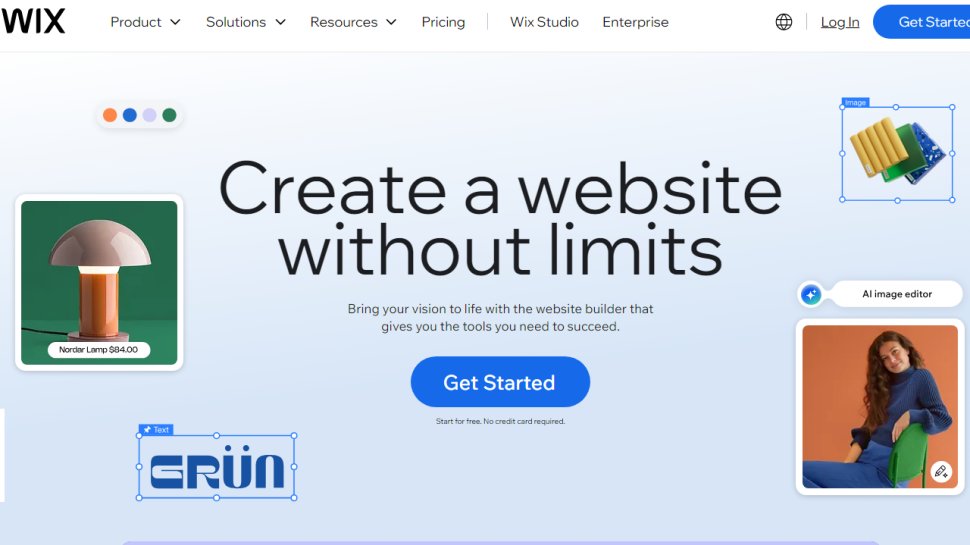
Reasons to buy
Reasons to avoid
Wix is our top Shopify alternative for small to medium businesses seeking an affordable and user-friendly platform. During our testing, we found the onboarding process remarkably smooth — even complete beginners can build professional-looking stores within hours using the intuitive drag-and-drop editor. What impressed us most was the support for over 80 payment gateways, significantly more than many dedicated ecommerce platforms, giving merchants exceptional flexibility in how they accept payments. You can see exactly how the two website builders stack up in our full Wix vs Shopify guide.
Wix shines brightest for creative businesses and entrepreneurs who prioritize visual appeal over complex functionality. Pricing remains genuinely competitive, too — Wix's ecommerce plans undercut Shopify's entry-level pricing while still delivering essential features like inventory management, loyalty programs, and discount capabilities.
Wix's biggest weakness is its hosting speed. We've experienced noticeable slowdowns both on storefronts and in the dashboard, which can impact user experience and conversion rates. Also, once you've built your site, switching templates requires essentially rebuilding from scratch — a limitation that becomes frustrating as businesses evolve. Still, Wix remains a solid choice for businesses prioritizing ease of use and affordability over advanced functionality.
Although Wix offers one of the best free website builder plans and a 'Light' plan at $17/mo, you'll need to opt for the Core Plan to access ecommerce features. This makes ecommerce access on Wix the same price Shopify, where plans start at $29/mo.
Read more in our full Wix review.
Best alternative to Shopify for flexibility
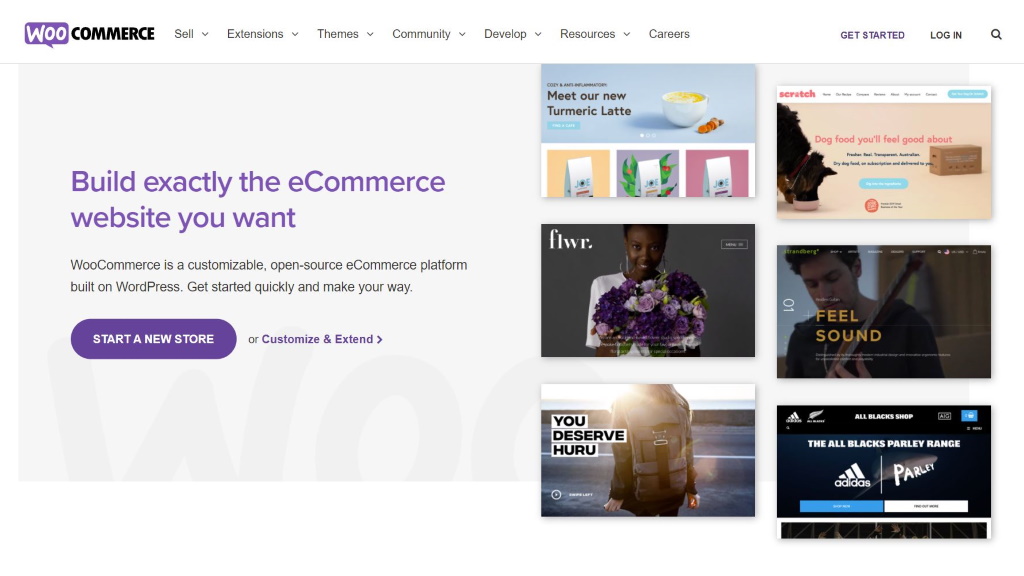
Reasons to buy
Reasons to avoid
WooCommerce appeals to businesses craving complete control over their online presence. As an open-source WordPress plugin, it offers unmatched flexibility — we've built everything from simple product catalogs to complex multi-vendor marketplaces using the same foundation. Its cost advantage is immediately apparent, since the core plugin costs nothing. But our experience shows most stores need several premium extensions to match the features of Shopify, BigCommerce, or Wix.
This platform's strength lies in its customization potential, so you can achieve pretty much anything with HTML, CSS, and JavaScript. Unlike Shopify's proprietary Liquid templating language, developers can use familiar code to create truly unique experiences. You also benefit from WordPress' strong content management capabilities, making it easier to build websites that go beyond product selling.
However, WooCommerce demands a lot of technical commitment. Maintaining security updates, optimizing performance, and troubleshooting issues requires either in-house expertise or ongoing developer relationships. Your site can struggle with large product catalogs without proper optimization, increasing hosting requirements. While the initial cost seems attractive, premium plugins, specialized hosting, and maintenance expenses can accumulate quickly.
You may choose to pair WooCommerce with one of the best WordPress website builders. These platforms, such as Elementor and Bluehost, offer AI or drag-and-drop website creators, making it quick and easy to build your website on top of the Wordpress CMS an WooCommerce.
Learn more in our WooCommerce review.
Best alternative to Shopify for large operations
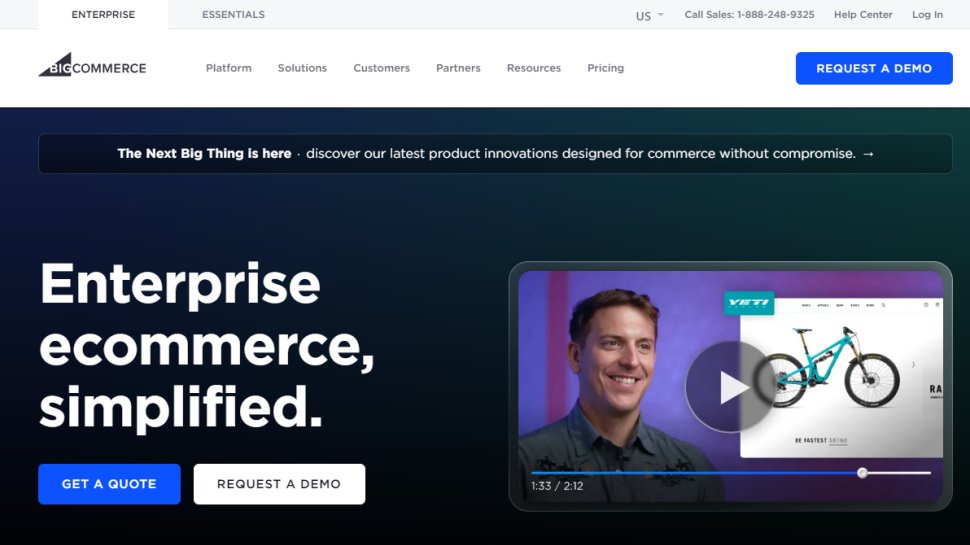
Reasons to buy
Reasons to avoid
BigCommerce is a great Shopify alternative for businesses that need enterprise-level features without the complexity. We loved the platform's built-in capabilities —features like multi-currency support, real-time shipping calculations, and advanced inventory management come as standard. Plus, there are no transaction fees, which can lead to significant savings for high-volume merchants. You can find a more detailed guide on how they stack up in our BigCommerce vs Shopify.
This is a very scalable platform. We've tested stores handling thousands of products and complex pricing structures without performance degradation. Also, BigCommerce lets you use the Catalyst toolkit to create custom front-end experiences. You can still use BigCommerce for backend operations, essentially like a headless CMS.
We've found limitations in customization compared to open-source alternatives like WooCommerce. But for mid-market businesses looking for room to grow, BigCommerce delivers exceptional value overall. Shopify also offers a little more in terms of AI-powered tools, with BigCommerce noticeably missing a full AI website builder.
When it comes to pricing and plans, there is a almost an exact match between Shopify and BigCommerce, each offering 3 general plans at $29/mo, $79/mo, and $229/mo, plus a separate plan for enterprise level users.
Read our full BigCommerce review to learn more.
Best alternative to Shopify for small businesses
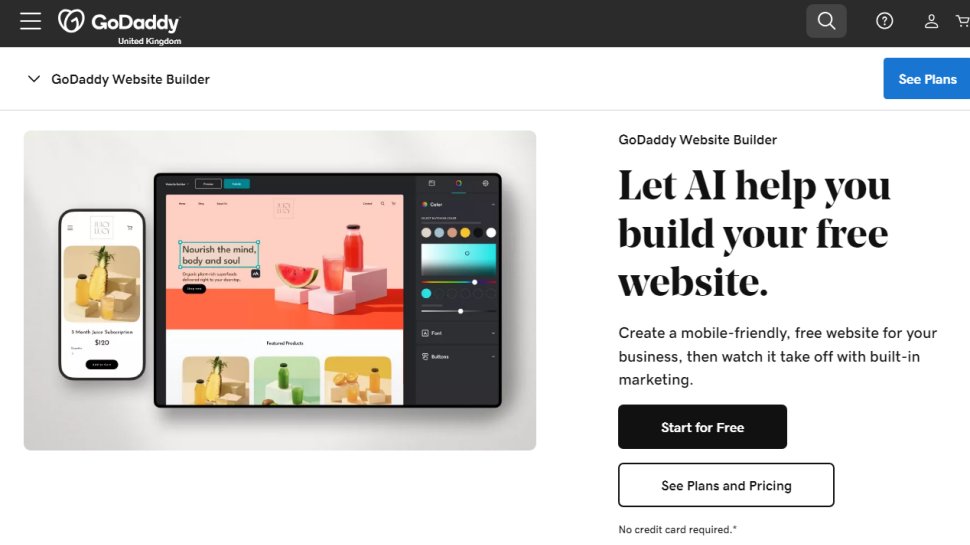
Reasons to buy
Reasons to avoid
GoDaddy targets small businesses, offering simple and affordable path to online selling. Its streamlined AI-powered builder can generate a complete website in minutes. Just provide your business name and industry. For time-conscious entrepreneurs who need a basic online presence set up quickly, GoDaddy's simplicity is genuinely valuable.
It works best for businesses with straightforward selling needs and limited technical requirements. We found the appointment scheduling feature particularly useful for service-based businesses, while the integrated domain registration simplifies the initial setup process. GoDaddy's strength lies in removing barriers. So you don't need design skills, technical knowledge, or significant budget to get started selling online.
That said, the section-based page builder locks you into predetermined layouts with minimal customization choices. Ecommerce features feel basic compared to dedicated platforms, with poor tax management tools and limited payment processor options. Most concerning is the lack of an app marketplace, meaning you can't use add-ons to extend features. While it's good for testing phases and side hustles, most online businesses will quickly outgrow this platform.
That being said, GoDaddy is a great platform for small businesses that want to get online quickly and easily. To sell online you will need to opt for the Ecommerce plan at $20.99/mo (intro rate, jumping to $34.99/mo after that).
Learn more in our full GoDaddy website builder review.
Best alternative to Shopify for hybrid retail
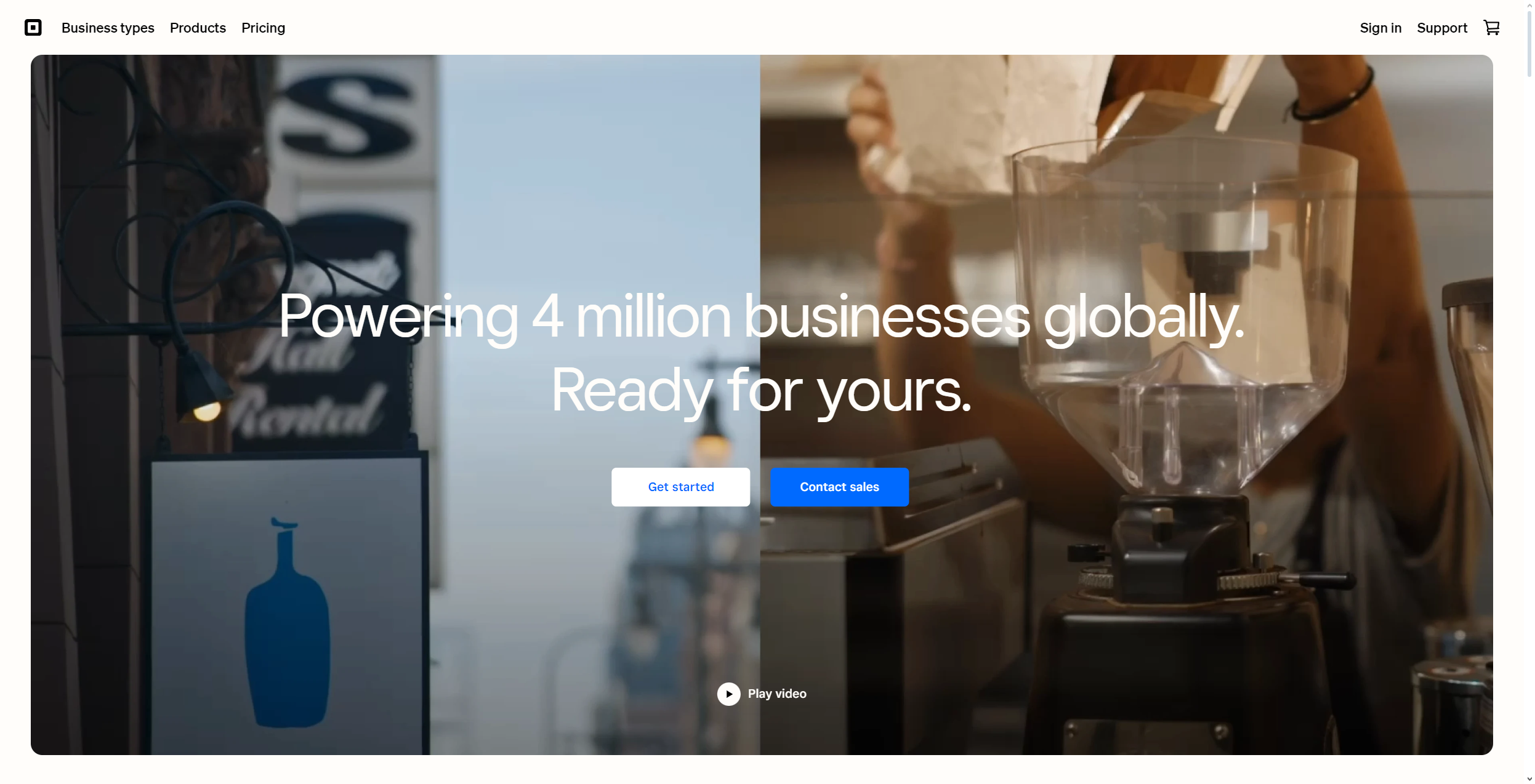
Reasons to buy
Reasons to avoid
Square Online is perfect for businesses operating both physical and digital storefronts. Thanks to the integration with Square's POS, inventory, orders, and customer data sync automatically across all channels. This eliminates a lot of headaches, making it very attractive for restaurants, retail, and service businesses expanding online.
Square's free plan lets you sell unlimited products with basic ecommerce functionality, this is a rare feature, with most website builders forcing you to buy a premium plan to sell online. However, the free plan comes with some limitations and we recommend upgrading so to remove the onsite branding.
Email and SMS marketing tools are surprisingly good for the price point. But, Square's ultimate strength lies in its simplicity. If you're already using it for in-person transactions, you can add online selling without learning any new systems.
That said, Square's editor has some very frustrating performance issues. You'll have to suffer through slow page loads and occasional 404 errors during editing. Theme selection feels restrictive, with vertical-only page layouts and low template variety. Square also lacks integrations with Amazon and Etsy, limiting multichannel growth opportunities. While it's perfect for small businesses with a physical presence, scaling online operations will probably need more sophisticated platforms.
Read the full Square Online review for more details.
Best alternative to Shopify for AI tools
Reasons to buy
Reasons to avoid
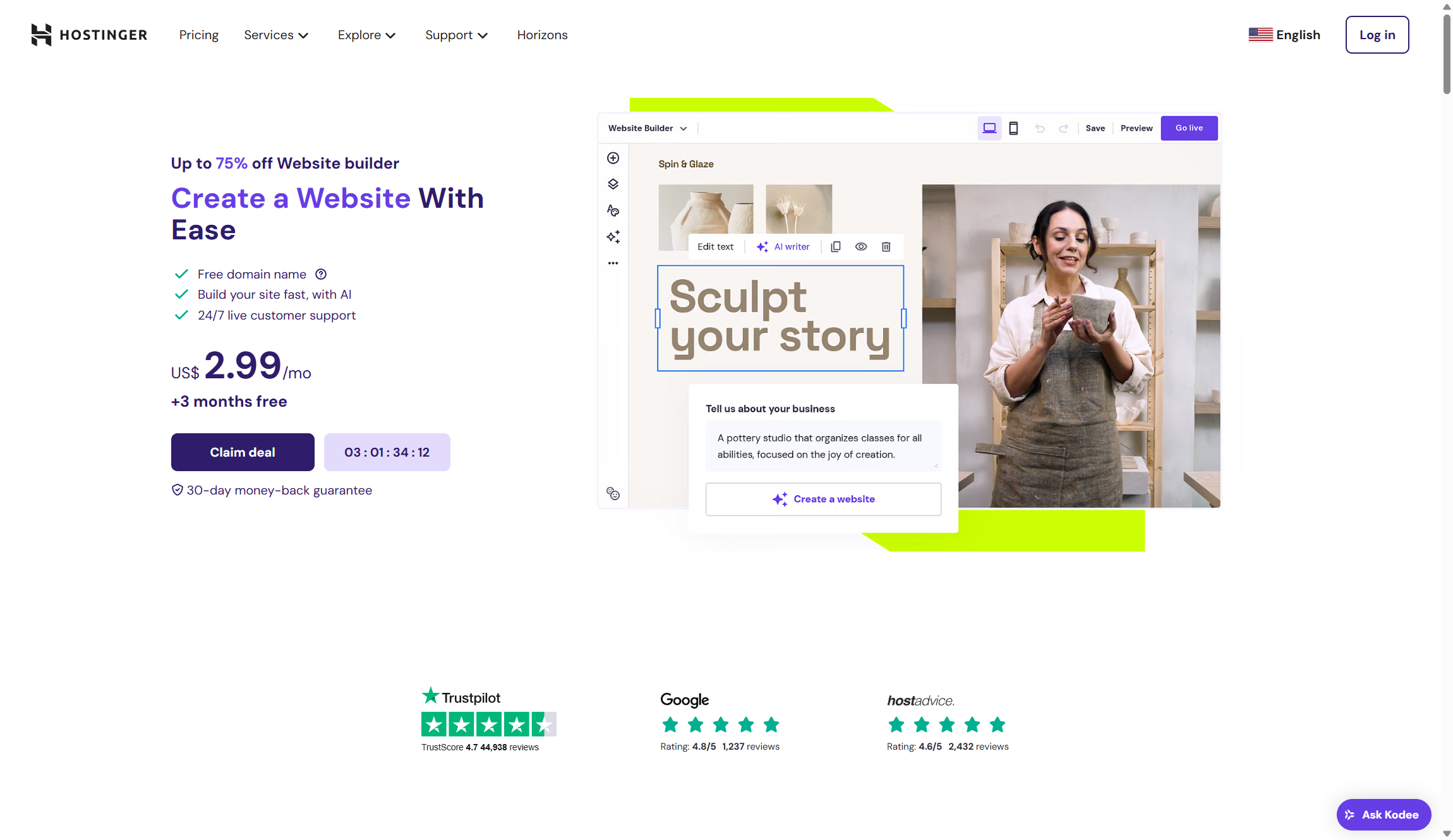
Hostinger's AI-powered website builder offers a very unique way to create online stores. You can generate entire ecommerce websites from simple descriptions. We saw it generate professional designs with product suggestions, layouts, and initial content based on little input. If your aim is to get online as quickly as you can, there's no better option.
Hostinger stands out from other budget options because of the quality of features delivered at a low price. It includes AI-generated product descriptions, automated SEO, and integrated email marketing tools with no add-ons required. Plus, the platform has no transaction fees, so businesses keep all their profits. The company's 24/7 multilingual support has response times of under 3 minutes, which is better than what we’ve seen on pricier platforms.
That said, Hostinger's 600-product limit restricts you from having larger catalogs. Since you can only have one currency per website, it makes international sales trickier. We noticed fewer templates than specialized ecommerce platforms, though you can generate any design with AI. This platform is best suited for small businesses, digital sellers, and service providers who want the quickest time to market at very low costs.
You'll need to opt for the Business Plan to unlock ecommerce features. This plan starts as low as $3.99/mo for a 4-year term, but bumps up to $13.99/mo, which is still far lower than Shopify's $29/mo entry level plan.
Read our full Hostinger website builder review to learn more.
Best Shopify alternatives: FAQs
Why are Shopify's transaction fees so expensive?
Shopify adds extra transaction fees of 0.5% to 2% if you don’t use Shopify Payments. So, if you choose PayPal, Stripe, or another processor, you’ll face both payment processor fees and Shopify's extra charge. This frustrates businesses with current merchant accounts or specific payment needs.
Even with Shopify Payments, fees start at 2.9% plus 30¢ per transaction. For high-volume sellers, this can quickly reduce profit margins.
Can I customize my Shopify store without hiring a developer?
Shopify provides themes and basic customization options. However, there are major limits if you need unique features. The platform uses its own Liquid templating language. This restricts changes unless you know the programming language.
Simple tasks, like adjusting checkout fields or making custom product pages, often need costly app purchases or developer help. Many merchants face these challenges quickly, especially when they want to create branded experiences that differ from standard templates.
How many pages can I have on Squarespace?
Squarespace allows up to 1,000 pages on current plans. However, they suggest keeping it under 400 pages for better performance. Sites near this limit may load slowly and have less functionality, especially on mobile.
Any users on the Legacy Personal plan have a stricter limit of 20 pages. For content-heavy publications or growing businesses, this can be a big hurdle for scaling content.
What happens to my store if I want to leave Shopify?
Shopify's closed ecosystem poses big migration challenges. Your theme customizations, app integrations, and unique features won't move to other platforms. You can export product data, but customer data, order history formatting, and SEO rankings often get messed up in the process.
Recreating your Shopify features on other platforms can take months of development. This often makes merchants feel trapped in the ecosystem, even if they're unhappy with pricing or limitations.
Does Shopify's customer support justify the cost?
Shopify's customer support can be hit and miss, despite its premium pricing. Response times for non-urgent issues can take days. Support representatives often lack the technical skills needed for complex problems.
Also, reviews note many cases where merchants got generic replies that didn’t solve their specific issues. Sometimes, they were told their problems needed costly developer solutions. For a platform with high rates, the support quality is not as good as other options that provide faster and more knowledgeable help.
How we test
To evaluate Shopify, we started by creating a new account. Then, we navigated the initial setup process. We explored the platform's interface. We examined the theme marketplace and drag-and-drop store editor. Also, we studied the product management system and built test pages to understand the customer experience.
We analyzed Shopify's pricing structure, along with features, transaction fees, and add-on costs. Then we looked at payment gateways, inventory management, and shipping options across different plans.
Check out our full guide to how we test website builders to learn more.
Sign up to the TechRadar Pro newsletter to get all the top news, opinion, features and guidance your business needs to succeed!

Ritoban Mukherjee is a tech and innovations journalist from West Bengal, India. These days, most of his work revolves around B2B software, such as AI website builders, VoIP platforms, and CRMs, among other things. He has also been published on Tom's Guide, Creative Bloq, IT Pro, Gizmodo, Quartz, and Mental Floss.
